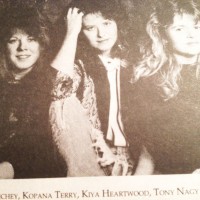Ace Autumn 1990
Stealin Horses: An Interview with Stealin Horses’ Kiya Heartwood. The next album is about artistic control.
BY STEVE MOONEY
Although Kiya Heartwood likes to think of her Lexington-based rock band Stealin Horses as a socially conscious outfit, when the group played before 48,000 people at Farm Aid in April of this year, Heartwood says changing the world, or e

“I was just prayin’ really hard that I wouldn’t forget the words and that my knees would quit shakin,” Heartwood recalls with the throaty good-natured laugh that often punctuates her conversation. “But it was really fun. I got to see a lot of bands I was really happy to get to see. I saw Elton John play.”
Stealin Horses, which began in Lexington in the early 80s as Radio Cafe, and which consists of the core unit of Heartwood and drummer Kopana Terry, was invited to Farm Aid by the camps of Willie Nelson and John Mellencamp. “We have a lot of poltiical convictions and they are in accord with the politics of Farm Aid, so we seemed to be a good choice,” Heartwood said. “When we got the invitation, we immediately accepted.”
Heartwood’s Farm Aid experience is certainly not her first brush with big names in the music business. Stealin Horses’ self-titled debut album, released in May 1988, was produced by Greg Ladanyi, who is responsible for the sound and tone of many records of Jackson Brown and Warren Zevon, among others. In addition, an all-star lineup of big time Los Angeles guest musicians lent a hand, including Waddy Wachtel, Danny Kotchmar, Steve Lukather, Mike Porcaro, Leland Sklar, and Russ Kunkel.
Perhaps Heartwood’s biggest coup, though, came when Neil Young, who was recording an album in LA’s studio, The Complex, offered the use of his talents. “He said he liked the song ‘Harriet Tubman,'” Heartwood recalls, “and he asked me what I wanted him to play and I said, ‘ whatever you want.'” Young chose to lace the song, a celebration of nineteenth century Southern women who aided escaping slaves, with his trademark harmonica.
Stealin Horses’ first album, recorded on teh Arista label, posted very good numbers for a first effort (“it sold about five times what Bruce Springsteen’s first record sold,” Heartwood says without pretension) and drew consistent critical praise for Heartwood’s songwriting and singing. The album is a mix of fine-tuned rockers (“Turnaround,” “Where All the Rivers Run,” “Rain”), songs with tightly-wound harmonies and great pop hooks (“Gotta Get a Letter to You”) and quieter, acoustic-based, folk-flavored numbers (“Harriet Tubman,” “Ballad of the Pralltown Cafe”). Arista released “Turnaround” as a single, and also footed the bill for a video and song, which MTV played twice a day for three months when the album first came out.
Yet, in hindsight, Heartwood is not entirely happy with the first album, which she says is “too slick.” In fact, Heartwood is well aware that many faithful Lexington fans, who had grown to love Stealin Horses’ unique live mix of punk, folk, rock, and metal, were somewhat surprised to see Heartwood and Terry on the album’s cover gussied up in the image of Emmylou Harris cowgirl types. Heartwood also knows that some fans were taken aback by the extremely polished production of the album, which ignores the punk/metal aspects of the band and instead concentrates on the folk/rock side.
Heartwood says Arista, one of more than fifteen labels which initially bid for Stealin Horses, simply didn’t know what to do with the band. “They were intrigued by the fact that we were from Kentucky and we weren’t a country band, that we were women, and we were talking about stuff like the Pralltown Cafe [the song frankly addresses alleged racism on the part of Lexington city officals.] It just freaked them out,” Heartwood said. “They didn’t know what to do with us. If you hear me talkin’ you think I sound like a hick and the marketing people get ahold of that and maybe they’ve never been outside of Manhattan and all they know is the Beverly Hillbillies, and it just affects their thinking.”
In addition, Heartwood says she was too passive when confronted with decisions that would influence the way her songs ultimately sounded.
“I was a young girl from Kentucky who didn’t expect to get a major record deal and I felt I was real lucky to be in the studio, and I couldn’t believe these people liked my songs,” Heartwood recalls. “They were saying ‘let’s do it this way. Trust us. We’ve sold millions of records.’ And I said OK. I didn’t feel good about it ’cause I didn’t think it was sounding right, but I just thought, Oh, I don’t know what I’m talkin about.'”
Finally, Heartwood says, “I don’t think there was enough communication between the record company and us, so that we could be heard. A lot of the people who were handling our career made a lot of decisions for us.” That lack of communication, combined with Heartwood’s unhappiness over the sound and some of the images attached to teh first album, led her to part ways with Arista in late 1989.
As is her way though, Heartwood accepts full blame for any shortcomings attributed to the first album. “I just didn’t handle it well,” she says, “and I’m not gonna blame anybody but me.” Also in her manner, Heartwood is able to see the positive as well as the negative sides of this first album experience. “You gotta see it for what it is,” she says, “it’s a decent record and we were real lucky to have it come out. It was a great struggle.”
After a moment’s careful thought, Heartwood adds, “Needless to say, we’ve gone through the darker side of the music business, we’ve come back out, and we’re still here. I don’t think we’re gonna be makin’ the same mistakes again.”
Heartwood said the first album as also useful in exposing the band to a lot of new fans. As part of subsequent tour duties, Stealin Horses performed in the opening slot for a wide vareity of groups, including bands like the Smithereens and Mighty Lemon Drops; groups hitting the comeback trail such as the Stray Cats; living legends like James Brown; and pop nightmares like Wang Chung.
Partly as a result of its extensive touring in spport of the first album, Heartwood says Stealin Horses now enjoys a broader based audience. “We have people in their fifties who really like the band, we got kids in Grateful Dead t-shirts, we got guys slam dancing,” Heartwood says. “I’m really happy that a cross section of people like the band.”
Heartwood says Stealin Horses’ second album, a full-length LP which will be in stores within the next year currently is being shopped around to various record companies, both major and independent labels.
Heartwood says that although Stealin Horses has not yet committed to any record company, the band can be patient because of the sales success of the first record. “Because we didn’t get to do what we wanted to do the first time, we’re being real patient about the second record,” adding “We’re mostly interested in artistic control. We’re very set on doing it our way. We want to say what we have to say in our own way, and we’re gonna go with whoever lets us do it our way.”
According to Heartwood, the second album will be “a lot more of what people who come to see the shows are used to hearing. It’s a little more raw, and it’s got a lot more thematic unity.” Heartwood says most of her songs are drawn from personal experience, thus many of the songs on the second LP are “about standing up for yourself and coming into your own because that’s what’s going on with me.” Outside of autobiographical songs, Heartwood says she writes a lot of songs “about regular people struggling but trying to stay positive and not just sitting back and letting their lives go by.”
Heartwood, who earned a degree in creative writing from the University of Kentucky, says she gets “real neurotic” if she doesn’t write regularly. She composes short stories as well as songs. In fact, she often thinks of her songs as short stories. “You can talk with music, you can say a lot without actually using language. You can use less words to say what you mean. So it’s possible to do short stories in three or four minutes.”
While Heartwood says she doesn’t think it’s the job of all rock music to be socially aware, she feels it’s necessary for Stealin Horses to take a stand on certain things. “I feel I have a responsibility as an artist not to write something that’s negative, not to put any more negative energy in the world,” she says, “I want people to feel good. I want them to think about things and to improve their lives if they can, and if anything they can get out of this band will help them do that, then great. I just feel like I want to do something with my life besides make money and do videos.”
Kiya Heartwood will be in Kentucky during the first week of September 1990 as part of a regional acoustic tour. She will perform in Lexington at Breedings on September 3, 1990; in Louisville at Tewligan’s on September 5, and in Whitesburg at Appalshop on September 6.








